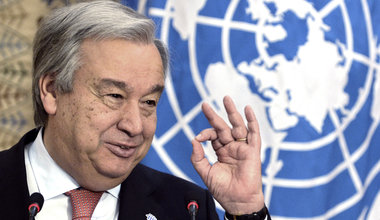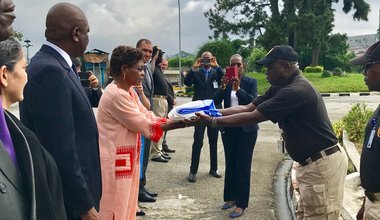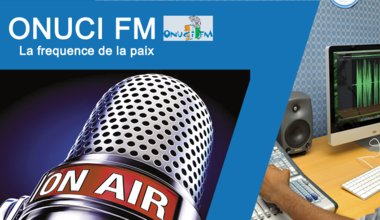PRESS REVIEW FOR MONDAY, 27 SEPTEMBER 2010
Choi exchanged
views with the American ambassador
Le Jour Plus –
The Special Representative of the United Nations
Secretary-General for Côte d'Ivoire, Y.J. Choi, on Saturday 25 September 2010
discussed the electoral process with the new American ambassador, Philippe
Carter III, at the UN Mission's headquarters in Abidjan. At the end of the
meeting, Mr. Carter said it was his first official meeting to UNOCI Chief in the
framework of his function as American ambassador to Côte d'Ivoire and he added
that he also came to find out about the progress of the electoral process which
is going through a crucial moment. "The United States of America support the
United Nations and the international community's efforts to ensure peaceful,
transparent and free elections", the ambassador said. The American diplomat
added that his country was examining how it could help Côte d'Ivoire retrieve
its economic and political position in the sub region after the elections.
UN sanctions in
the event of postponement
L'Intelligent
d'Abidjan –
In a document by Coverseas Worldwide Assistance S.A on Côte
d'Ivoire (which was produced before 6 September 2010), we note that the United
Nations is closely monitoring the date of 31 October which was planned by the
Independent Electoral Commission (IEC) for the first round of the presidential
election. According to the document, there will be sanctions if elections are
postponed. "If the elections are postponed again later than 1st
January 2011, some members of the Security Council recommend to vote reinforced
sanctions to freeze the financial funds and forbid the movements of the
principal political leaders abroad in order to make them be sensible", the
document states. In other words, if the first round of the presidential election
is not held on the scheduled date, Gbagbo, Bédié, Soro, Ouattara, Mabri, Wodié
and Mel will be most targeted in the implementation of these sanctions; that is
to say the principal signatories of the Marcoussis Agreement, whose political
parties are represented in parliament and the government. No camp will be
accused if the elections are postponed. The United Nations is therefore ready to
sanction everyone; given the leaders are the persons who put the country into
compromise by signing the agreements. And the international community finally
understood that the political leaders love this cold war-situation. This is
therefore a strong signal to the Ivorian political actors to give priority to
the interest of the nation. According to the sanctions that are seemingly about
to be voted by members of the Security Council, they are all condemned to hold
elections between October and December 2010. Procedures must be scrupulously
respected. If not, the principal leaders will be sanctioned by the United
Nations.
Crisis-resolution / Electoral process – Côte d'Ivoire towards elections with
arms
Le Quotidien –
(...)
Presented as a significant operation before elections, disarmament is the
slowest operation in the electoral process. In fact, even if there have been
lots of achievements regarding the production of the voters list, some observers
and even Ivorian actors are still worried regarding the establishment of peace
in the country. (...) in the ex-besieged zones, the Forces Nouvelles (FN) is still
in control of the areas. We are still struggling to finance the cantonment of
ex-combatants of the FN. Consequence: with the passage of time, the elements are
leaving the cantonment sites to return home. "We went to Bouna to attend a
training programme. Out of 200 ex-combatants, only 10 attended the training
session", said the chief of a training company specialized in the implementation
and realization of projects. Many ex-rebels are still in possession of their
arms. This worrying situation also exists in the government zone. The elements
of the self-defence groups or the militias are threatening to disrupt the
electoral process if their problems are not resolved. (...) there is a first group
composed of the ex-members of the militia in the West. They are complaining that
they were not taken into account in the reintegration programmes. (...) The second
group is composed of elements who are demanding the payment of 500 000 FCFA. (...)
Bringing up financial difficulties, the government is negotiating a less
expensive disarmament. But the ex-militiamen are not ready for such an option.
This is what the recent sit-in of the elements of the GPP around the president's
office shows. Violently dispersed by the security elements, the elements of the
GPP said they will not give up.
Latest survey by
TNS-SOFRES
Le Temps –
If the Ivorian opposition could make the French Company for Surveys (SOFRES)
keep silent; it would have done it with pleasure. Its latest survey done from 24
August to 3 September 2010, on 1400 Ivoirians is once again taking the
opposition aback. (...) Out of the three principal actors, Laurent Gbagbo,
Alassane Dramane Ouattara and Henri Konan Bédié, the former is more likely to
win the presidential election on 31 October. 58% of the persons who were
questioned said Gbagbo will win. (...)
 ONU
ONU Nations Unies Maintien de la paix
Nations Unies Maintien de la paix



